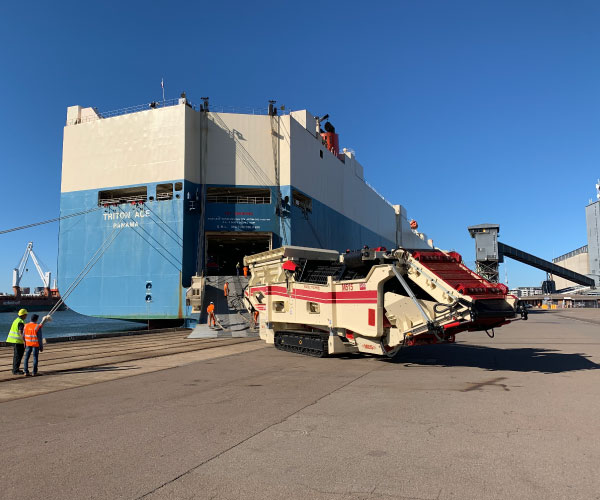

For the first time since 2013, a roll-on roll-off (ro-ro) vessel is scheduled to call at Port of Newcastle with a commercial cargo.
The Höegh Autoliners operated 200-metre Triton Ace – an impressive white and blue ‘floating car park’ capable of carrying up to 6500 cars – will stop in Newcastle this morning (Friday 8 May).
The shipment – the first of two ro-ro calls in two months – comes as the Port continues to diversify trade and provide more competitive supply chain alternatives for Australia’s importers and exporters.
Triton Ace will deliver a number of large pieces of mining machinery headed for customers in the local area.
Ro-ro ships are loaded and unloaded using ramps, enabling cars, trucks, heavy machinery and farming equipment to quickly move on and off the ship.
Port of Newcastle CEO Craig Carmody said the organisation was looking at ways to help stimulate the local economy as the region worked towards economic recovery and more diverse income streams.
“A lot of local businesses are doing things pretty tough at the moment. We are committed to helping the region to grow and get people back on their feet as the recovery begins,” Mr Carmody said.
“There are thousands of people newly out of work and all of us need to look at ways we can create more jobs, more investment and a better economy than the one we started this crisis with.
“This is a small but important first step – the Port is open to any new trade opportunities.”
The Port’s Acting Executive Manager Business Development, Matthew Swan, welcomed the partnership with Höegh Autoliners and other supply chain partners.
“Together we are challenging the status quo and enabling freight to reach the final destination quicker, cheaper and more efficiently,” Mr Swan said.
“It makes sense for equipment heading to our region, whether the Central Coast, Hunter Valley or agricultural customers further afield in regional NSW, to come via Newcastle and reduce unnecessary truck movements.”
Höegh Autoliners is growing its Australian service and contributing to lower supply chain costs and the avoidance of obstacles to the freight of ro-ro cargo in the country.
Höegh Autoliners’ Australian Sales Manager, Nicky Colaço, said a regular service to Port of Newcastle would support its regional NSW and Hunter Valley based customers.
“With the capability to berth at the Port of Newcastle, it will not only help the company expand its shipping routes but also offer customers in the agriculture, mining and construction industry an alternate option to bring cargo closer to its destination,” Mr Colaço said.
Port of Newcastle has enlisted the services of veteran shipping consultant Richard Bailey, from Loch and Quay Consulting, to engage with industry and inform the Port’s planning and design as it seeks to diversify trade and support emerging markets.
“It is such an exciting time for Port of Newcastle, which is in the unique position of being able to plan for a suitable port landscape at a time when technology in vehicles, equipment, and the supply chain is evolving rapidly,” Mr Bailey said.
“Investment and planning now will ensure the Port emerges as a serious participant in this vital supply chain into the future.”
The next ro-ro vessel, Hoegh Trove, is due at Port of Newcastle on Sunday 12 July.
Höegh Autoliners’ service to Australia has two routings; one originating in Europe and calling South Africa and the Indian Ocean Islands before ending in Oceania. And the second routing sailing via the US and the Caribbean Islands on its west bound passage from Europe to Oceania. Cargo loaded in Australia is usually transhipped in Japan, China or Korea and destined for Europe, Africa and the Americas.
Höegh Autoliners’ also delivered a once off consignment of the first light rail carriage to Newcastle in 2018.
Port of Newcastle
Port of Newcastle is a major Australian trade gateway handling 4,600 ship movements and 171 million tonnes of cargo each year. With its annual trade worth about $25 billion to the New South Wales economy, the Port enables businesses across the state to successfully compete in international markets. With a deepwater shipping channel operating at 50% of its capacity, significant port land available and enviable access to national rail and road infrastructure, Port of Newcastle is positioned to further underpin the prosperity of the Hunter, NSW and Australia. As custodians of the region’s critical asset, Port of Newcastle is diversifying its trade as it strives to create a safe, sustainable and environmentally and socially responsible Port that realises its potential.
